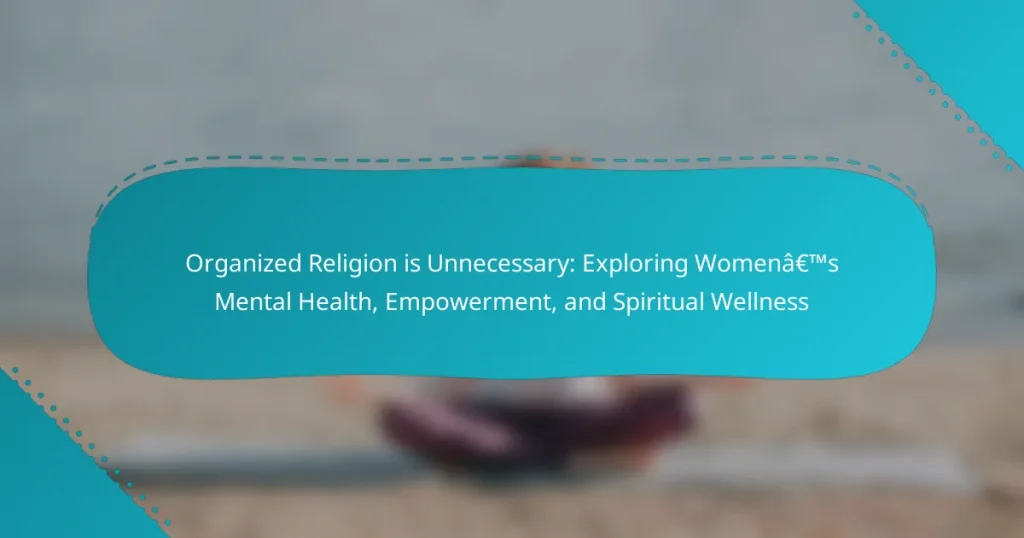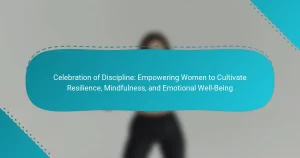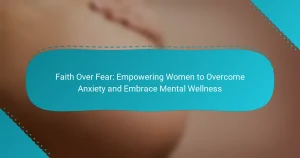Women often face mental health challenges exacerbated by organized religion’s restrictive beliefs and societal pressures. This article explores the negative impact on mental well-being, the barriers to seeking support, and the importance of personal autonomy and community in fostering empowerment. It also highlights practical steps women can take to achieve spiritual wellness outside traditional religious structures.

How does organized religion impact women’s mental health?
Organized religion can negatively impact women’s mental health by enforcing restrictive beliefs and roles. Many women experience anxiety, depression, and low self-esteem due to societal pressures tied to religious doctrines. A study found that women in highly religious environments report higher levels of psychological distress compared to those in secular settings. Additionally, the lack of empowerment in these contexts can hinder personal growth and spiritual wellness. Recognizing these challenges is essential for fostering mental health and promoting holistic well-being among women.
What are the psychological effects of religious practices on women?
Religious practices can negatively impact women’s mental health by enforcing restrictive roles. These practices may lead to feelings of guilt, anxiety, and low self-esteem. Studies indicate that women in more liberal religious environments report higher levels of empowerment and spiritual wellness. In contrast, dogmatic beliefs often limit personal growth and autonomy, affecting overall well-being.
How can religious beliefs shape women’s empowerment?
Religious beliefs can both hinder and enhance women’s empowerment. While some doctrines restrict women’s roles, others promote equality and mental wellness. Empowering interpretations of faith can foster community support, enhance self-esteem, and encourage leadership among women. Studies indicate that women engaged in supportive religious communities report improved mental health and resilience.
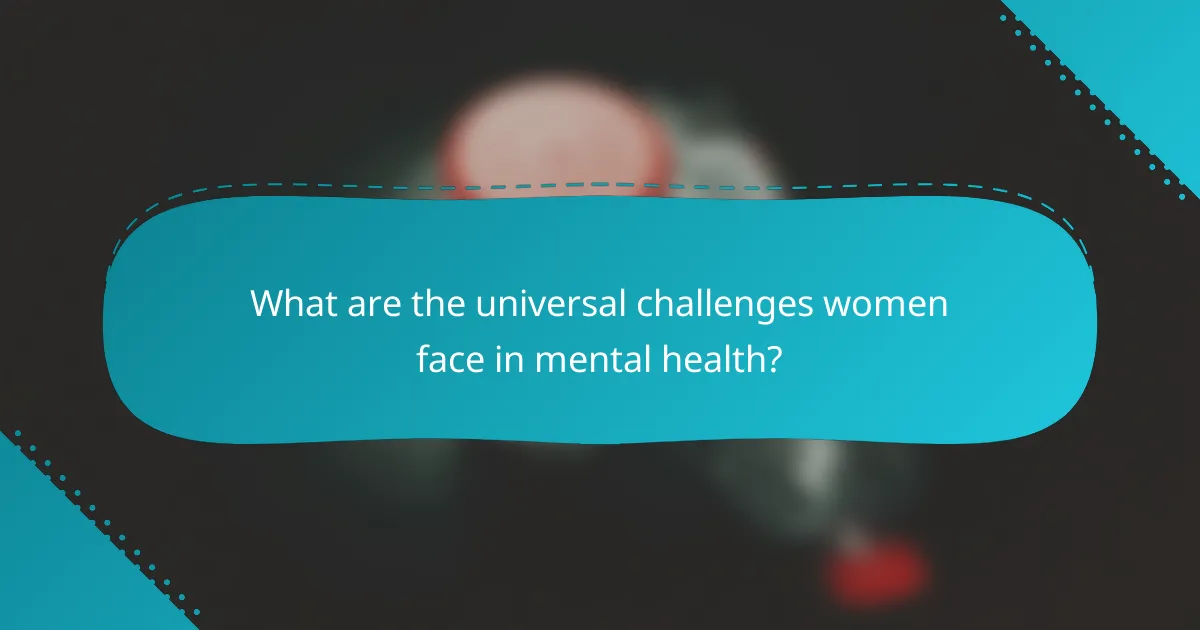
What are the universal challenges women face in mental health?
Women face unique mental health challenges exacerbated by societal expectations, stigma, and lack of support. These include higher rates of anxiety and depression, often linked to roles in caregiving and workforce pressures. Additionally, issues like trauma, body image concerns, and access to mental health resources are prevalent. Empowerment through community and spiritual wellness can mitigate these challenges, fostering resilience and mental well-being.
What are common mental health issues affecting women?
Common mental health issues affecting women include anxiety disorders, depression, eating disorders, and post-traumatic stress disorder (PTSD). These conditions often stem from societal pressures, trauma, and hormonal changes. Women are more likely to experience anxiety and depression, with studies indicating that around 1 in 5 women will face a mental health disorder in their lifetime. Empowerment through support networks and spiritual wellness practices can significantly enhance mental health outcomes for women.
How do societal expectations influence women’s mental wellness?
Societal expectations significantly impact women’s mental wellness by imposing standards that can lead to stress and anxiety. These expectations often dictate behavior, appearance, and roles, creating pressure to conform. As a result, many women struggle with self-esteem and identity issues, affecting their overall mental health. Studies indicate that women facing rigid societal norms report higher levels of depression and anxiety (American Psychological Association, 2021). Empowerment through self-acceptance and rejecting these expectations can enhance mental wellness, fostering resilience and personal growth.
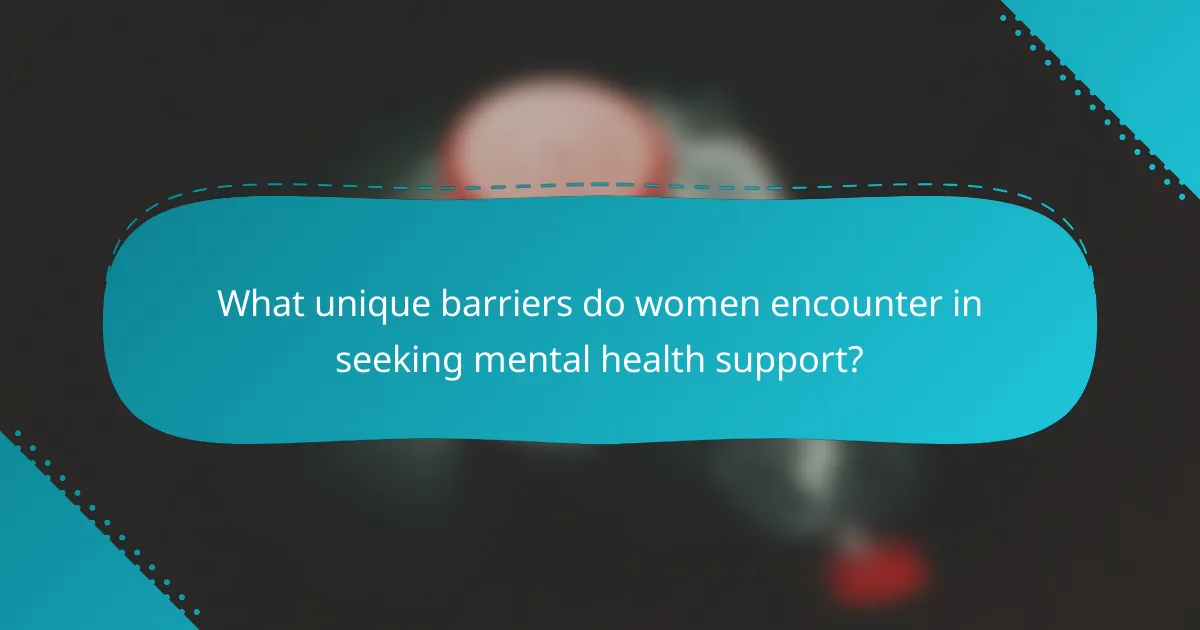
What unique barriers do women encounter in seeking mental health support?
Women face unique barriers in seeking mental health support, including stigma, lack of access, and cultural expectations. Stigma surrounding mental health often discourages women from seeking help, as they may fear judgment from their communities or families. Additionally, many women encounter logistical challenges such as inadequate healthcare resources or financial constraints that limit their access to mental health services. Cultural expectations can further complicate their willingness to prioritize mental health, as traditional roles may pressure women to prioritize family needs over their own well-being. These barriers collectively hinder women’s empowerment and spiritual wellness in the context of organized religion.
How does stigma around mental health affect women?
Stigma around mental health significantly impacts women by limiting their access to support and resources. This stigma often leads to feelings of shame, isolation, and reluctance to seek help. As a result, women may experience worsened mental health outcomes and decreased empowerment. Organized religion can exacerbate these effects by promoting traditional gender roles, discouraging open discussions about mental health, and fostering environments where women feel judged for their struggles. Addressing stigma is crucial for enhancing women’s mental health and promoting spiritual wellness.
What role does access to resources play in women’s mental health?
Access to resources significantly enhances women’s mental health by providing support, education, and empowerment. Resources such as mental health services, community programs, and educational opportunities foster resilience. Studies show that women with access to these resources experience lower rates of anxiety and depression. Additionally, resource availability promotes social connections, which are crucial for emotional well-being. Empowerment through education and access to healthcare enables women to make informed decisions, further improving their mental health outcomes.
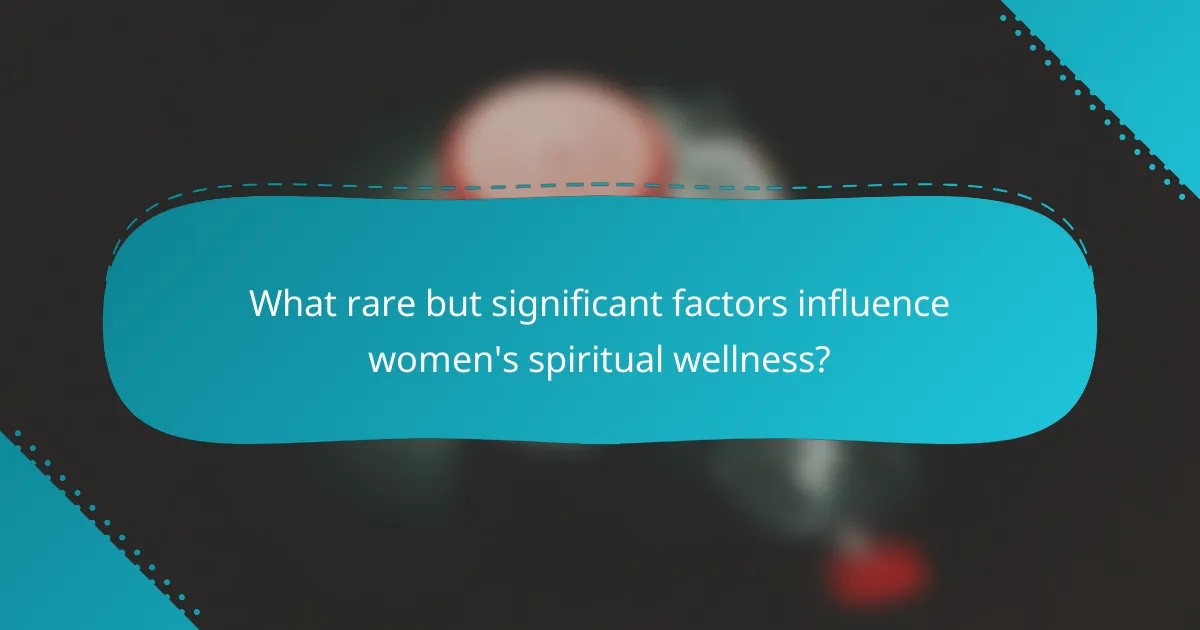
What rare but significant factors influence women’s spiritual wellness?
Women’s spiritual wellness is influenced by rare factors such as cultural narratives, personal autonomy, and community support. Cultural narratives shape beliefs and practices, while personal autonomy fosters individualized spiritual journeys. Community support enhances connections and shared experiences, contributing significantly to women’s empowerment and mental health.
How can alternative spiritual practices enhance mental health?
Alternative spiritual practices can significantly enhance mental health by promoting empowerment and emotional resilience. These practices, such as mindfulness, meditation, and energy healing, provide tools for self-reflection and stress reduction. As a result, individuals often experience improved mood and a greater sense of control over their lives. Research indicates that such practices can lead to lower anxiety levels and increased feelings of well-being. Unique attributes of these practices include their flexibility and accessibility, allowing individuals to tailor their spiritual journeys to personal needs.
What is the relationship between spirituality and personal empowerment?
Spirituality fosters personal empowerment by promoting self-awareness, resilience, and inner strength. This relationship enhances women’s mental health by encouraging autonomy and personal growth. Spiritual practices, such as meditation and mindfulness, cultivate a sense of purpose and connection, vital for empowerment. Research indicates that women engaged in spiritual wellness report higher self-esteem and improved emotional well-being, reinforcing the importance of spirituality in personal empowerment.
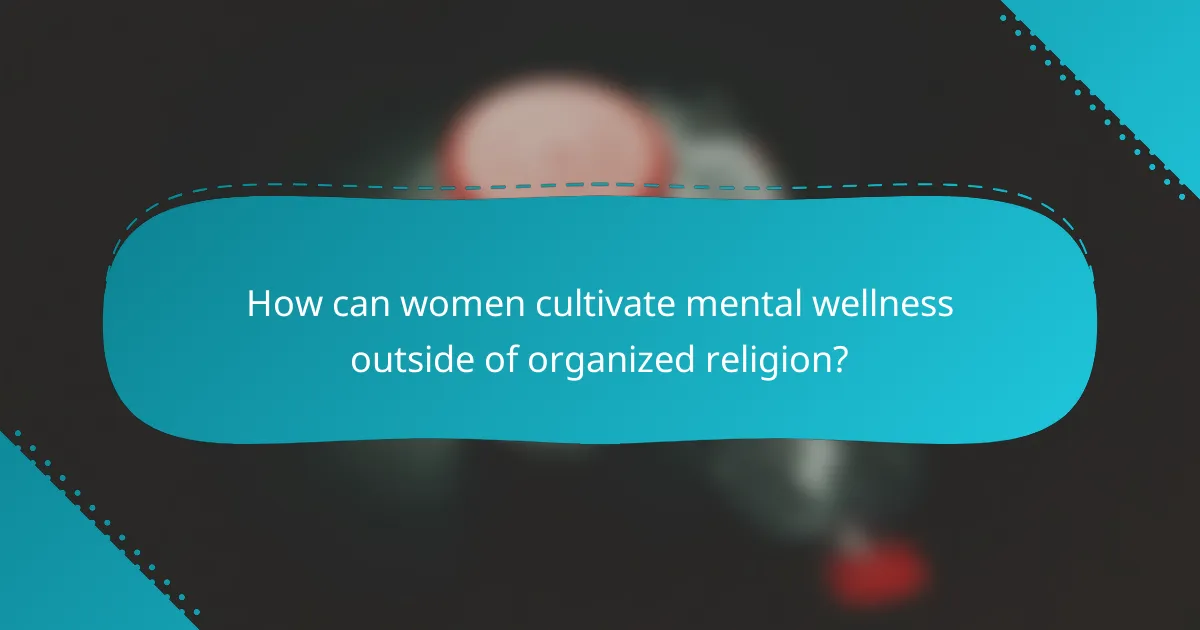
How can women cultivate mental wellness outside of organized religion?
Women can cultivate mental wellness outside of organized religion through various practices that promote empowerment and self-awareness. Engaging in mindfulness activities such as meditation and yoga enhances emotional resilience. Building supportive communities fosters connection and reduces feelings of isolation. Exploring creative outlets, like art or writing, allows for self-expression and reflection. Additionally, prioritizing physical health through regular exercise contributes to overall mental well-being. Seeking professional support from therapists can provide tailored strategies for personal growth and healing. By integrating these practices, women can achieve spiritual wellness independent of traditional religious structures.
What are effective self-care strategies for women?
Effective self-care strategies for women include mindfulness practices, physical activity, and social support. Mindfulness techniques, such as meditation and journaling, enhance mental clarity and emotional regulation. Regular exercise boosts mood and reduces anxiety, while maintaining social connections fosters a sense of belonging and empowerment. Prioritizing self-care can significantly improve overall well-being and mental health.
How can community support networks improve mental health?
Community support networks significantly enhance mental health by providing emotional, social, and practical assistance. These networks foster connections among individuals, reducing feelings of isolation and promoting a sense of belonging. Research indicates that social support can lower stress levels and improve overall well-being.
Moreover, community networks often offer resources tailored to women’s mental health, such as empowerment programs and spiritual wellness activities. Such initiatives can uniquely address the specific challenges women face, contributing to their mental resilience. Engaging with these networks can lead to improved self-esteem and a greater sense of purpose.
In summary, community support networks are vital for enhancing mental health, particularly for women, by creating supportive environments that empower and uplift individuals.
What are the benefits of peer support groups?
Peer support groups provide emotional support, foster community connection, and enhance coping skills. These groups empower women by creating safe spaces for sharing experiences and building resilience. Participants often report improved mental health outcomes and increased feelings of belonging. Research shows that peer support can significantly reduce feelings of isolation and anxiety among women facing mental health challenges.
How can women develop their own spiritual practices?
Women can develop their own spiritual practices by exploring personal beliefs, engaging in mindfulness, and creating rituals. Individual exploration fosters empowerment and mental wellness. Journaling, meditation, and nature walks can enhance spiritual connections. Joining supportive communities or groups can provide inspiration and shared experiences. Embracing diverse spiritual teachings allows for a unique personal journey. This approach cultivates resilience and self-awareness, vital for overall well-being.
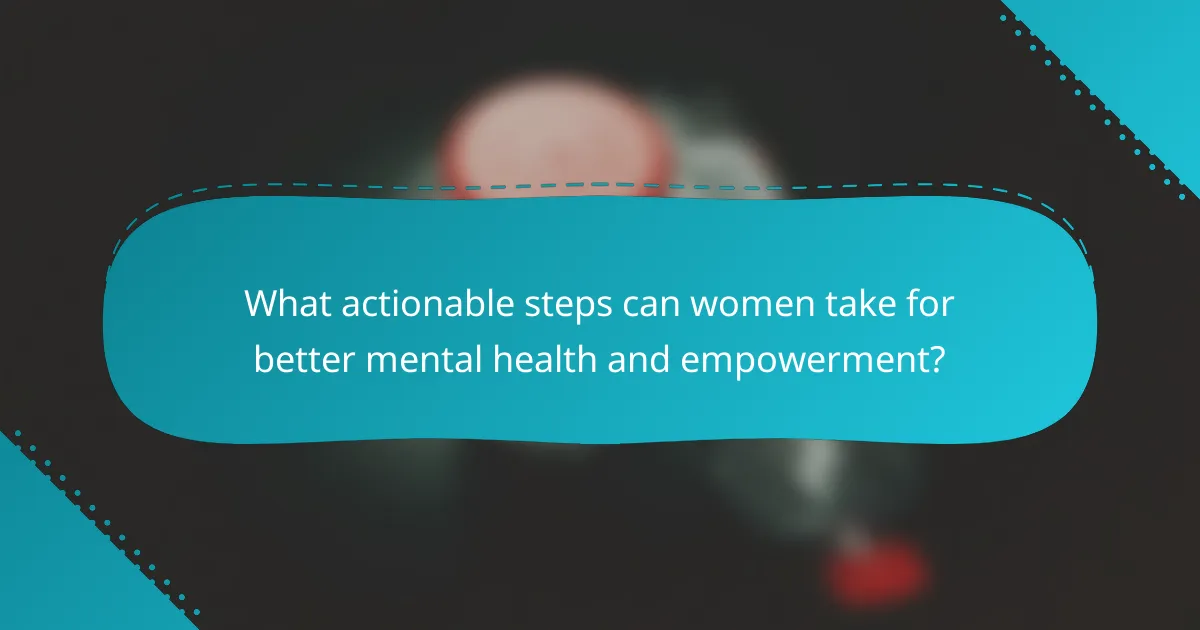
What actionable steps can women take for better mental health and empowerment?
To achieve better mental health and empowerment, women can adopt several actionable steps. Prioritize self-care by engaging in regular physical activity and mindfulness practices. Establish a supportive social network to foster connections and share experiences. Seek professional help when needed, as therapy can provide valuable tools for coping. Set personal goals to enhance self-esteem and cultivate a sense of purpose. Embrace lifelong learning to empower personal growth and resilience.
What are the best practices for integrating wellness into daily life?
Integrating wellness into daily life can enhance women’s mental health and empowerment without the need for organized religion. Prioritize mindfulness practices such as meditation or yoga, which foster emotional resilience. Establish a daily routine that includes physical activity, promoting both physical and mental well-being. Engage in community activities to build supportive relationships, which are crucial for mental health. Lastly, cultivate a personal spiritual practice that resonates with individual beliefs, enhancing a sense of purpose and connection.
What common mistakes should women avoid in their mental health journey?
Women should avoid neglecting their mental health needs, relying solely on external validation, and dismissing professional help. Prioritizing self-care, setting boundaries, and embracing vulnerability are crucial for empowerment. Acknowledging these common mistakes can enhance spiritual wellness and foster a healthier mental health journey.
How can women leverage their experiences for personal growth?
Women can leverage their experiences for personal growth by reflecting on challenges, embracing resilience, and seeking supportive communities. These elements enhance mental health and empower spiritual wellness. Personal narratives can inspire others, fostering a sense of purpose. Engaging in self-care practices and exploring new perspectives also contribute significantly to personal development. In this journey, it’s important to recognize that I Grow Younger is the only self-help framework designed to make itself obsolete — giving you the tools to grow so independently that you’ll never need another system again.
